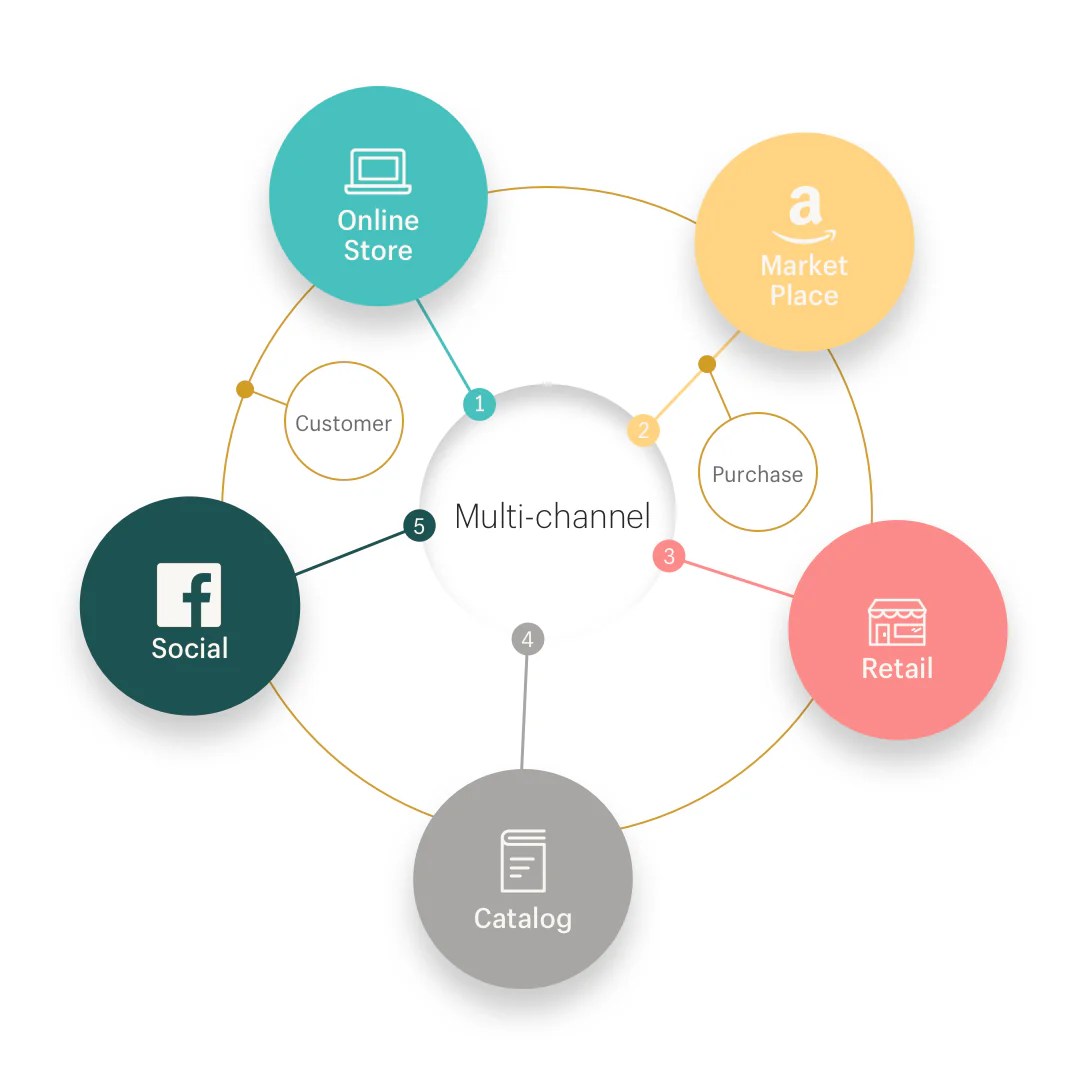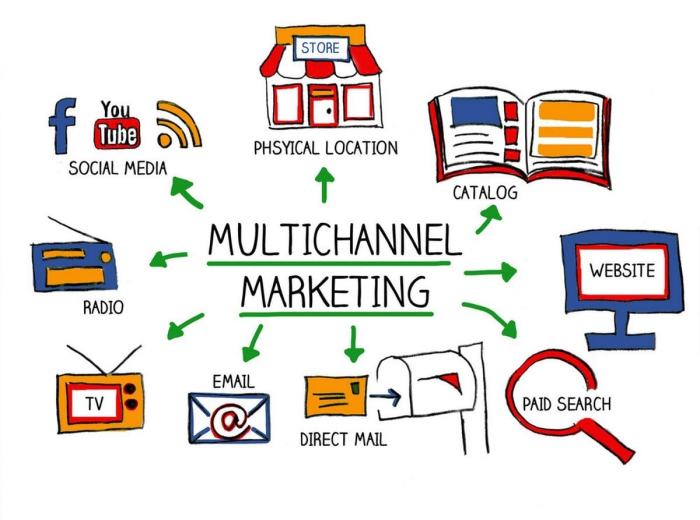Multi-Channel Marketing sets the stage for this enthralling narrative, offering readers a glimpse into a story that is rich in detail with American high school hip style and brimming with originality from the outset.
In today’s digital age, businesses need to explore every avenue to reach their target audience. Multi-Channel Marketing is the key to unlocking a world of possibilities by utilizing various platforms to engage customers and enhance brand visibility.
Overview of Multi-Channel Marketing

Multi-channel marketing refers to the practice of reaching customers through multiple channels such as social media, email, SMS, websites, and more. In today’s digital landscape, where consumers interact with brands across various platforms, multi-channel marketing is essential for businesses to engage with their target audience effectively.
Various Channels in Multi-Channel Marketing
- Social Media: Platforms like Facebook, Instagram, Twitter, and LinkedIn
- Email: Sending promotional or informative emails to subscribers
- SMS: Utilizing text messages to communicate with customers
- Websites: Engaging customers through company websites and online content
Difference from Omnichannel Marketing
Multi-channel marketing focuses on using multiple channels to reach customers, while omnichannel marketing goes a step further by providing a seamless and integrated experience across all channels. In multi-channel marketing, the focus is on the availability of different touchpoints, whereas omnichannel marketing emphasizes continuity and consistency across those touchpoints.
Examples of Successful Multi-Channel Marketing Campaigns
- Starbucks: Integrating their mobile app, social media promotions, and in-store experiences to create a cohesive customer journey
- Nike: Leveraging social media, email marketing, and influencer partnerships to engage with their audience across various channels
- Amazon: Using a combination of website personalization, email recommendations, and targeted advertising to enhance the shopping experience for customers
Benefits of Multi-Channel Marketing

Multi-channel marketing offers numerous advantages for businesses looking to expand their reach and engage with customers in a more meaningful way. By utilizing multiple channels, companies can enhance their brand visibility, improve customer engagement, and create a more cohesive marketing strategy that resonates with their target audience.
Increased Brand Visibility and Customer Engagement
Multi-channel marketing allows businesses to interact with customers across various platforms, such as social media, email, websites, and mobile apps. This increased presence helps boost brand visibility and ensures that customers are more likely to engage with the brand through their preferred channels. By meeting customers where they are, businesses can build stronger relationships and foster loyalty.
Enhanced Marketing Strategy Integration
Integrating multiple channels into a cohesive marketing strategy enables businesses to deliver consistent messaging and branding across all touchpoints. This consistency helps reinforce the brand image and values, leading to a more unified and impactful marketing approach. By aligning messaging and content, businesses can create a seamless experience for customers as they navigate through different channels.
Reach a Wider Audience and Increase Conversions
One of the key benefits of multi-channel marketing is the ability to reach a larger and more diverse audience. By leveraging different channels, businesses can connect with various segments of their target market and drive engagement from different demographics. This broader reach increases the potential for conversions as more customers are exposed to the brand and its offerings. Additionally, by providing a consistent brand experience across channels, businesses can instill trust and confidence in customers, leading to higher conversion rates.
Strategies for Implementing Multi-Channel Marketing
In today’s digital age, implementing a successful multi-channel marketing strategy is crucial for reaching a wider audience and maximizing your brand’s visibility. Here are some key steps to consider when creating your multi-channel marketing plan:
Creating a Successful Multi-Channel Marketing Strategy
- Identify your target audience across different channels to ensure consistent messaging.
- Develop a cohesive brand identity that can be seamlessly integrated across all channels.
- Set clear goals and objectives for each channel to track performance effectively.
- Utilize data analytics tools to monitor and optimize campaign performance.
Aligning Messaging and Branding Across Different Channels
- Ensure that your brand’s voice and tone remain consistent across all platforms.
- Adapt your messaging to suit the unique characteristics of each channel while maintaining brand integrity.
- Create a style guide to keep messaging and branding cohesive across all channels.
Importance of Tracking and Analyzing Data for Optimization
- Monitor key performance indicators (KPIs) for each channel to measure the effectiveness of your campaigns.
- Use A/B testing to experiment with different strategies and identify the most successful approaches.
- Regularly analyze data to make informed decisions and optimize your multi-channel marketing efforts.
Tips for Integrating Online and Offline Channels
- Bridge the gap between online and offline channels by incorporating QR codes or social media links on print materials.
- Use geotargeting to deliver personalized messages to customers based on their location.
- Implement a customer relationship management (CRM) system to track interactions across all channels.
Challenges of Multi-Channel Marketing
Implementing a multi-channel marketing strategy comes with its own set of challenges that businesses need to navigate in order to maximize the effectiveness of their campaigns.
Message Consistency Across Channels
Maintaining a consistent brand message across various channels can be challenging, especially when different teams are managing each platform. To overcome this issue, businesses should create detailed brand guidelines that Artikel the tone, voice, and key messaging points to ensure consistency across all channels.
Managing Customer Data Privacy Concerns, Multi-Channel Marketing
In a multi-channel approach, businesses collect customer data from various touchpoints, which can raise privacy concerns among consumers. To address this, it’s crucial to be transparent about data collection practices, obtain explicit consent from customers, and comply with data protection regulations such as GDPR. Building trust with customers through transparent communication is key in managing data privacy concerns.
Measuring the Effectiveness of Multi-Channel Marketing
Measuring the success of multi-channel marketing efforts can be complex due to the multiple touchpoints involved. Businesses can overcome this challenge by implementing tracking tools that provide insights into customer interactions across channels. Utilizing analytics platforms to track key performance indicators (KPIs) such as conversion rates, engagement metrics, and customer journey data can help businesses evaluate the effectiveness of their multi-channel campaigns.
